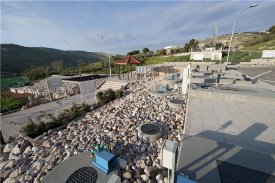Mar 21 2010
Jordan has joined the ranks of nations interested in decentralised wastewater treatment technologies. On Thursday, a representative of the German Ambassy officially handed over the first demonstration facility for decentralised wastewater management to Al-Balqa Applied University in the Jordanian town of Fuheis near Amman. The site was designed by the Helmholtz Centre for Environmental Research (UFZ) in collaboration with BDZ, an initiative for the promotion of decentralised wastewater treatment in Leipzig, with support from the German Federal Ministry of Education and Research (BMBF).

The site develops decentralised wastewater treatment technologies and adapts them to the arid local conditions. A network consisting of the Jordanian Ministry of Water, the UFZ, BDZ, the Applied University of Al Balqa and the German and Jordanian companies Huber SE, ATB Umwelttechnololgien GmbH, Ecoconsult and NAW aims to extend the development work to larger drainage areas over the next few years. This means that the project can serve as a model for other arid countries.
Jordan’s 2009 water strategy is to increase the volume of recycled wastewater more than fourfold to 256 million cubic metres per year by 2022. Jordan is one of the driest countries on earth and covers most of its water requirements from groundwater. However, over-exploitation of water resources and the booming population are jeopardising long-term water supplies. For instance, the water level of the Dead Sea is falling by a metre each year. Most of the water is used for agricultural irrigation. It is estimated that recycling treated wastewater could reduce the pressure on groundwater resources by around a fifth. Jordan already recycles 18 million cubic metres of water per year. The researchers hope that the demonstration facility will also set a positive example for the neighbouring countries with rapidly expanding populations. The United Nations estimates that water supplies will become critical for two-thirds of the world’s population as early as 2025.
The recently opened demonstration plant in Fuheis is part of the international research project SMART (Sustainable Management of Available Water Resources with Innovative Technologies). Israeli, Palestinian, Jordanian and German researchers, ministries and companies are working together within the project to draw up an integrated water resources management strategy for the Jordan River drainage basin, which extends over several Middle Eastern countries. Because of the high water requirements and low water volumes, the strategy has to include all available resources: groundwater, surface water, wastewater, brackish water and rainwater. Recycling wastewater is therefore as much a part of the concept as the protection of water resources against pollution, artificial groundwater recharge, and demand management through an adjusted pricing policy.
“The experiences in Fuheis help us to optimise operating costs and the stability of the wastewater technology pilot plants in the arid Arab climate. Next we want to put this know-how into practice on a larger scale,” explains project manager Dr Roland A. Müller of the UFZ. At the moment, the UFZ researchers, the Jordanian Ministry of Water and the research team are planning to implement decentralised wastewater treatment technologies and the associated operator concept in a pilot village in Jordan. Later on, the idea is to introduce decentralised wastewater treatment to larger regions in collaboration with development banks, thereby making additional water resources available for reuse. The research activities are therefore supporting sustainable management of limited water resources in this sensitive region.